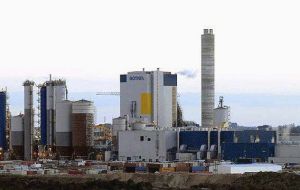MercoPress. South Atlantic News Agency
Uruguay Botnia pulp mill has not affected air and water quality
 Botnia - Uruguay
Botnia - Uruguay An international report on the environmental performance of the Botnia pulp plant in Uruguay, since its opening last November, indicates no quality modifications to the air or water of the River Uruguay next to which the huge Finnish owned complex has been built.
"The comparison of monitored data before and after the beginning of operations in the plant shows that the quality of water from the River Uruguay has not changed as a consequence of the operations of the processing plant", reads in its main part the release from the Canadian consulting company Ecometrix. The report contracted by the International Financial Corporation from the World Bank and one of the funds suppliers for the Botnia project, states that the Finnish company complies with the maximum concentration limits of such elements as phosphorus, sulfates and mercury, among others, according to the environmental conditions imposed by Uruguay's Environment Office. Regarding the quality of air, the Ecometrix report states that it is below the limits established in the operations authorization and concludes that "it can be said that there are no risks for human health" from the plant's functioning. The head of Botnia's Environment Department Gervasio Gonzalez said that the report is an unbiased "external and qualified" insight of the situation which amply ratifies previous reports. The release coincides with the first six months of Botnia's operations. Argentine private environmental reports have confirmed that contamination is inside the limits that can be expected for a project of this industry. The one million tons pulp plant built on the river Uruguay which acts as a natural border with Argentina has been at the heart of a dispute with Argentine authorities that allege the pulp industry processing system is contaminating, regardless of what environmental reports indicate. Besides Argentina objects to the plant arguing that contrary to an accord dating back to the seventies for the joint management and initiatives on the River Uruguay, the project has moved forward without consulting with Buenos Aires. The several years dispute has reached the International Court of The Hague, (the case was presented by Argentina) and the Mercosur controversies tribunal (presented by Uruguay) because pickets have cut all access to Uruguay across an international bridge linking the cities of Fray Bentos and Gualeguaychú in Argentina. Uruguay alleges pickets are interrupting the free flow of people and products among Mercosur member countries. Argentina argues Gualeguaychu residents have a right to protest and set up road blocks, and the Kirchner administrations will not use force to dislodge them. Gualeguaychu residents complain the pulp mill will ruin their tourism industry (with contaminated air and water) but figures have shown the contrary since the dispute has attracted more tourists than before. Argentina originally demanded a re-location of the Botnia plant and the King of Spain was asked to act as a dialogue "facilitator" between the neighboring countries. His special envoy efforts did not yield any results. Botnia began full production last November and has so far exported over 400 million US dollars in pulp to several countries.




Top Comments
Disclaimer & comment rulesCommenting for this story is now closed.
If you have a Facebook account, become a fan and comment on our Facebook Page!